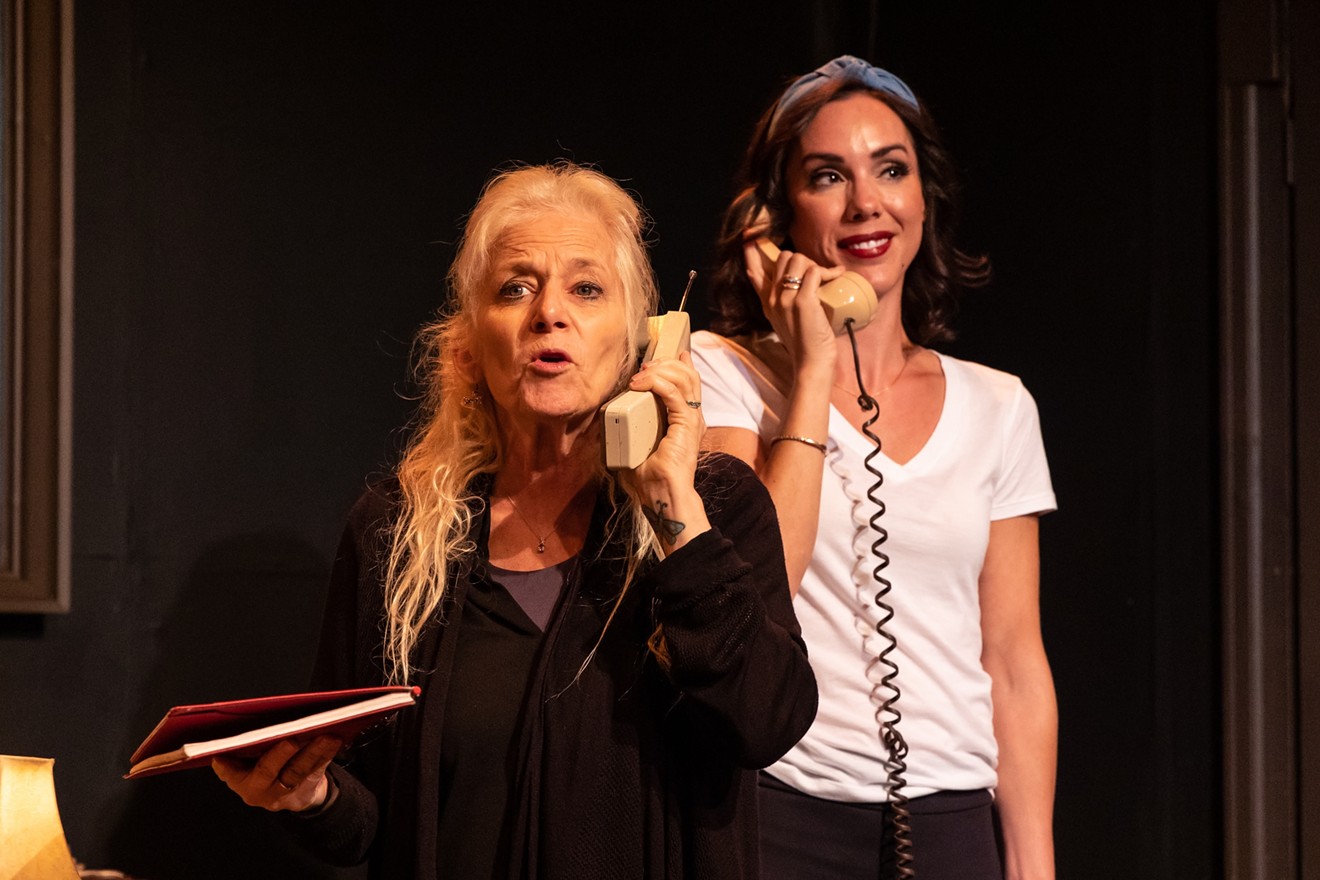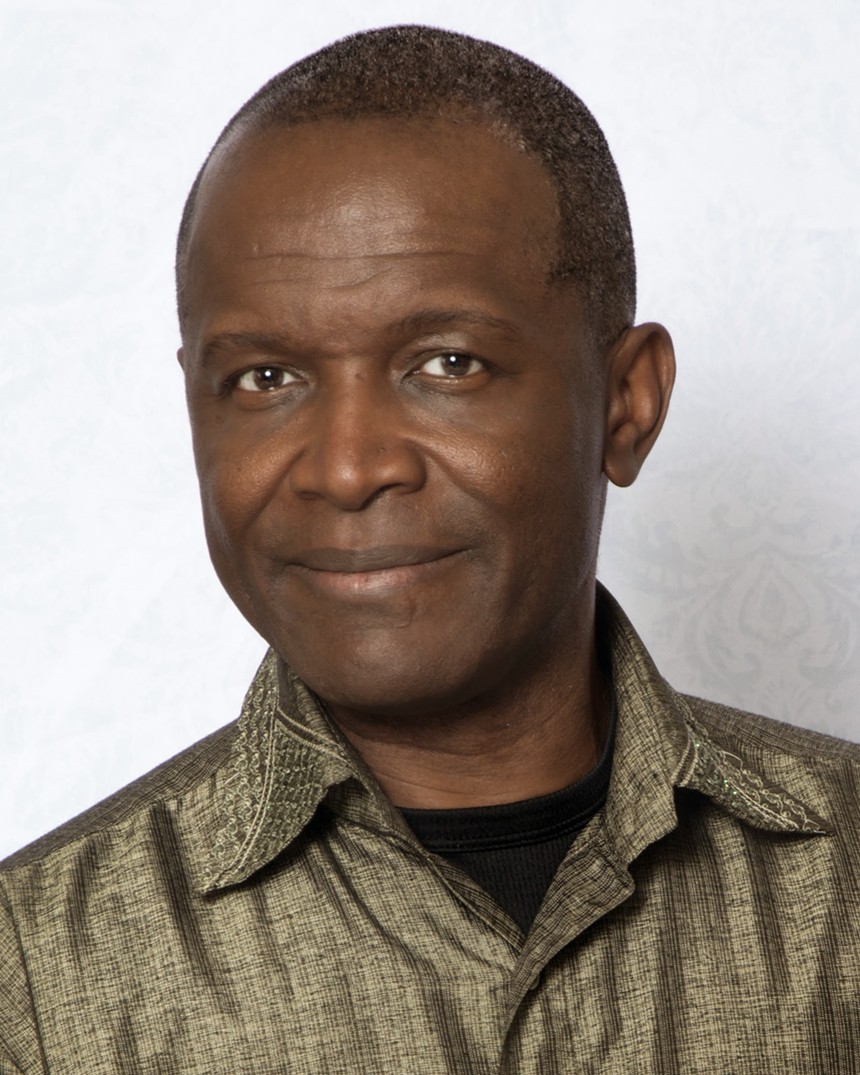Vintage Theatre opened its season earlier in the month with the lighthearted musical The Drowsy Chaperone, but the next offering on the roster is more serious: the regional premiere of Julia Cho’s The Piano Teacher, a cunningly constructed, seemingly cozy piece with darkness at its core. The protagonist, Mrs. K, appears to be a typical kindly piano teacher, now retired and sitting alone in her home, talking about her past students.
There is a shadow in her life, however. Her husband, who is now deceased, was an immigrant from a war-torn country.
Vintage produced Cho’s The Language Archive three years ago, and artistic director Bernie Cardell was impressed with the work. “So I went back to see what other plays she had and found this gem,” he says. “I was taken with the character of Mrs. K, and knew what a wonderful challenge she would be for an actor. And the hunger for authentic connection is something everyone can relate to.”
Vintage “got through the last few years the way most theaters here did,” according to Cardell. “Flexibility, ingenuity, and community. Today we have more season subscribers than we ever have in our history, and performances are selling out. Audiences are hungry for the connective, community experience that live theater offers.”
The Piano Teacher opens September 23 and runs through October 16, with a lively mix of drama, comedy and musical entertainment filling out the season.
Dwayne Carrington readily agreed when asked by Cardell to direct. He's no stranger to issues of identity and empathy. I first saw him on stage twenty years ago, in Shadow Theatre Company’s production of Athol Fugard’s My Children! My Africa! He played a kindly teacher — also known by an initial: Mr. M — who works at a school in a poor Black township. He is supervising debate preparation between a spirited young white girl and the area’s star debater, eighteen-year-old Thami. The two spar ferociously, but they also learn from each other and eventually form a deep friendship — until politics intervenes. Thami, having become radicalized, repudiates that friendship, and Mr. M’s attempts at reconciliation, as well as his belief that education is the solution to political violence, lead to his own death.
Carrington brings specific insight to The Piano Teacher. Cho, he notes, is a Korean-American playwright who studied at Berkeley, New York University and Juilliard. She doesn’t always specify her characters’ backgrounds, but she “tries to place her cultural values in every show that she writes,” he says.
“She’s more of a memory-type playwright,” he adds. “There are a lot of monologues in her shows. Mrs. K starts calling former students, and eventually two of them visit her. She has an exchange with one, but then things take a dark turn.
“It’s Mrs. K’s story. But it centers around the relationship with her husband, though he’s never seen in the show," Carrington explains.
The script doesn’t specify the country Mr. K fled, but “I put some Easter eggs in the show, and one is actual names,” says Carrington. “I made one name up on the basis of where Mr. K could have been from, what his homeland was. Cho writes with things that impress her from life, and I heard she’d read about the Rwanda genocide. That’s what the gist of the husband is about — this midwestern woman meets this guy, marries him, and has experience of what happened in his life juxtaposed with her being a piano teacher.”
Although the play is not very long, Carrington finds it profoundly nuanced. “The show and the characters are so complex, you can’t read it once and get it," he says. "Every time you read it, there’s a new layer.”
When Carrington first reads a play he plans to direct, he does it as an audience member, he explains, asking himself, “What’s the impression I walk away with?"
My first thought was three characters in need of being whole," he says of The Piano Teacher. "That’s the spine of the play. These are somewhat broken individuals, outsiders in their own right.”
The Piano Teacher can be unsettling, he admits, “but it’s not all dark.”
Carrington has been able to work in theater as an actor during the last two years despite the pandemic, and he’s also fortunate that his day job utilizes his acting skills. He works with two universities, Anschutz Medical Campus and the Denver Osteopathic and Sports Medicine Center, where he takes on the role of different patients with various health problems so that medical students can practice interacting with patients and learn "bedside manner."
“One thing I tell [students] is the difference between this and what doctors really do: At the end of this session, nobody dies from your mistakes,” he says. He also reminds them, “Years ago, your parents and grandparents were with their doctor for thirty or forty years. Today, patients have a choice. How will your practice survive if you don’t know how to communicate with them?
“I may take a case where a patient is diagnosed with Alzheimer's, and play it from when it’s first diagnosed to six or seven years later, when the patient is in their last days," he continues. "The student has to talk to them, both husband and wife. They have to understand when to use silence, when to talk or not talk. They have to read the room. Eventually, the family has to sit down with the medical team and talk about the patient in their last days. Some students have come back and said, ‘I’ve had that exact situation, and if I hadn’t had this class, I wouldn’t have known how to handle it.’”
Carrington has often worked as an actor in plays exploring issues of race, identity and prejudice. Last year he played several roles in The Scottsboro Boys, a musical that Vintage staged with director Betty Hart that tackles one of the uglier events in American history — when nine teenage boys in Alabama were accused of raping two white women. He was also involved with Shadow from the beginning. Under the direction of actor/producer Jeffrey Nickelson, the theater mounted a decade of fascinating and instructive work at the former Ralph Waldo Emerson Center before moving in 2008 to the space on Dayton Street that Vintage now occupies. The largest of its three performing spaces is named for Nickelson.
“I was one of the few people that stood in that space when it was empty,” Carrington recalls. “Totally gutted out. Jeffrey and I stood on that stage. He started to lay out his vision to me. We were both very happy.”
But the fine new building also had upkeep problems — ongoing funding was an issue, and there were problems with the board. Nickelson resigned, and a year later died of a heart attack.
“Shadow was his mistress,” says Carrington. “He loved her to death, and she eventually killed him. I tend to believe that the spirit of Jeffrey is in this building. I’ve sat in the main theater and there’s rumbling, like someone’s walking across the ceiling. I’ve always put that down to being his spirit. And I’ve always welcomed that.”
One of the functions Shadow provided best was training young Black actors, he says. But now it can be harder for directors to cast their shows. Although the outcome was highly successful, “it was very difficult to cast The Scottsboro Boys,” he notes. “To find fifteen Black male actors in Denver, Colorado — that’s a feat. There’s still situations where I’ve been cast because they needed a Black guy, or now an older Black guy. I was typecast a lot. Oh, you’re the angry Black man. And I’m like, 'Why? I’m Black, but I’m not angry.'
“But work is work," he continues. "I always look at the role and see what the role is about. I never take on a role that’s beneath me or would misrepresent who I am as a person.”
Some years ago, Carrington was cast as Hoke in Driving Miss Daisy, a play that was considered liberal in the 1980s but now raises serious questions about race and privilege. “Hoke is a man of his times,” says Carrington. “There are things he might have to submit to as a hired man.” He and his co-stars, Sam Gregory and Billie McBride, were aware of these issues and worked closely and collegially with each other.
“To this day,” Carrington says, laughing, “Billie calls me Hoke whenever I see her, and I call her Miss Daisy.
“I try to find honor in it, and if I can’t find the honor, I don’t deal with it.”
Driving Miss Daisy is also on the Vintage schedule this fall.
Carrington feels that the increased awareness following the terrible death of George Floyd is a good thing, but says that "since his death, there have been countless cruelties and murders that didn’t get attention," he notes. "There are innocent lives taken. Hundreds of men and women killed just for being who they are. Man’s inhumanity to man. That’s part of what Julia Cho tries to show in all of her plays, and specifically in this one.”
The Piano Teacher, Vintage Theatre, 1468 Dayton Street, Aurora, through October 16, 7:30 p.m. Fridays and Saturdays; 2:30 p.m. Sundays. Tickets are $34 general admission.
[
{
"name": "Air - MediumRectangle - Inline Content - Mobile Display Size",
"component": "12017618",
"insertPoint": "2",
"requiredCountToDisplay": "2"
},{
"name": "Editor Picks",
"component": "17242653",
"insertPoint": "4",
"requiredCountToDisplay": "1"
},{
"name": "Inline Links",
"component": "18838239",
"insertPoint": "8th",
"startingPoint": 8,
"requiredCountToDisplay": "7",
"maxInsertions": 25
},{
"name": "Air - MediumRectangle - Combo - Inline Content",
"component": "17261320",
"insertPoint": "8th",
"startingPoint": 8,
"requiredCountToDisplay": "7",
"maxInsertions": 25
},{
"name": "Inline Links",
"component": "18838239",
"insertPoint": "8th",
"startingPoint": 12,
"requiredCountToDisplay": "11",
"maxInsertions": 25
},{
"name": "Air - Leaderboard Tower - Combo - Inline Content",
"component": "17261321",
"insertPoint": "8th",
"startingPoint": 12,
"requiredCountToDisplay": "11",
"maxInsertions": 25
}
]














